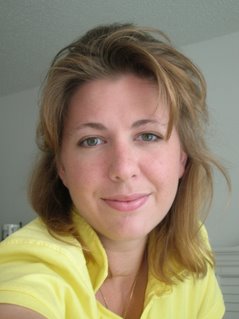Weekend in Review
This weekend FLEW. It went so quickly that when my alarm went off this morning, I thought it was only Sunday and rolled over.
Remember that book by Richard Scarry, "What Do Busy People Do All Day?"?
I dusted every flat surface.
I dusted my car's insides.
I vacuumed.
I made cilantro chutney, pork vindaloo, indian-style rice pudding from scratch, and a chicken dish with tomatoes and cilantro (my own concoction. They say the best chemists are also the best cooks.).
I began drying fresh mint bundles.
I rearranged the front closet to make room for winter gear (rearranging leads to the domino effect--my place is small, so if I rearrange one part, I usually have to rearrange everything). I then rearranged my closet, under the bed, bathroom cupboard, and cupboard under the kitchen sink.
I bought a mortar and pestle--I've been waiting a year to find one.
I visited a new international food store, where everything is in a non-English language.
I administered drug to my mice in the lab.
Did I knit? Um, sort of. I began blocking (the zillionth incarnation of) the front of the Teriokhin braid and discovered a split stitch, oh, a good TWO-THIRDS of the way down the front. Reason #457 why I HATE stockinette stitch, you don't have to pay attention to your work. Deep breath: I repaired it. Does that count as knitting?


4 Comments:
How do you have time to do all that (let alone knit) as a doctor in surgical training!!
Kristina--
My surgery residency is punctuated by 2 years of laboratory research (I started year 2 of 2 in July). I began my residency at a well-known (notorious?) program in Texas and have transfered here (for safety's sake, I won't say where) to finish the residency. Why? --Long story, but in retrospect it probably centers around some health-related issues. So, laboratory research give me some flexibility to take care of my health, go to doctors' appointments, make a trip to Mayo Clinic for a 3rd opinion, now likely make a trip to Stanford for more diagnostic tests (don't worry, I'm not terminal! :o) ), and, on occasion, cook, clean, and knit.
Well, that explains a lot. I was curious how you seemed to be doing two things (research and surgical residency)at the same time. I hope that your medical issues are not too serious - although they do sound to be. Good luck.
The health issues aren't terribly serious. They just invade tremendously on my life. So, since you asked. . . I have a sleeping disorder--fortunately NOT narcolepsy. It's basically obstructive sleep apnea without the apnea (the part where you stop breathing). Instead of stopping breathing, I wake up-- in some cases, 300 times a night. In residency, you're expected to be constantly sleep-deprived, but when I started my research fellowship, the fatigue just didn't end. So, after 4 sleep studies and an MSLT (google it) in 6 months, trying medical management, seeing the ENT folks, and now seeing the oral and maxillofacial surgeons, it seems that the problem is because my mandible never advanced far enough during development, which means that maxillo-mandibular advancement surgery (google again) may be an option. But before such a major surgery is done, OMFS wants the "gold standard" diagnostic test to confirm that the jaw is the problem, and it's only done at a few places in the US, including Stanford (where the guy who "wrote the book" on this problem is, and he happens to be a friend of my sleep doc). I guess the nickname I was given as a baby--Jaws, for getting all my teeth so early, get it, like the shark?--has come full circle.
Would CPAP help instead of surgery? Perhaps. For my 4th sleep study, we had to use it as a sort of diagnostic tool, and yes, I slept better, but I still woke up a lot with it. It's unbearable. Plus, because I don't have the apnea episodes, insurance won't pay for it.
It's taken a while to diagnose, since I don't fit the stereotype of the overweight male, 40-ish, with a "bull neck" (thick neck). I'm a 20-is woman, 5'10", 140#. Who knew???
One thing that I've learned through all of this is that even though surgery residency can be a miserable existence most of the time, being a patient is infinitely worse. Ultimately, I think my experiences will make me a better, more compassionate surgeon, and that thought is just about the only thing getting me through all this!
Hopefully I didn't bore you here! Perhaps it will help someone else.
Post a Comment
<< Home